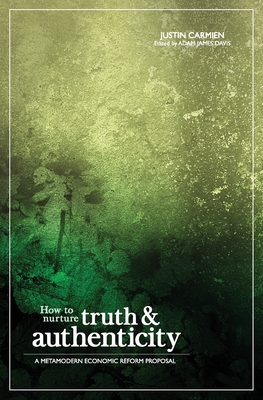How to Nurture Truth and Authenticity: A Metamodern Economic Reform Proposal

How to Nurture Truth and Authenticity: A Metamodern Economic Reform Proposal
In the 1920s, the German philosopher Martin Heidegger attempted a novel definition of truth. This was required in order to firmly delineate the sense of being. Taking the Ancient Greek αληθεια as his directive, he collapsed the subjective / objective dichotomy and surmounted the understanding of truth as an assertion in agreement with reality. Heidegger came to an understanding of truth more robust than what is assumed by the scientific industries. He identified the nature of truth as disclosive. This understanding proved to have immense explanatory power over the positivist understanding of the nature of truth as fact. Unfortunately, this understanding was never allowed to blossom; still, to this day, we suffer from the state of affairs in which our political mechanisms are grounded upon narrow conceptions of the nature of truth as fact. Consider the political economy in which truth in service to today. To be sure, the failing institutions of democracy (post-truth), social justice activism, and the prevalence of conspiracy theory are all evidence that the mechanisms of technocratic governance (which make use of truth as "fact!") are unable to satisfy the ideal of democracy. Therefore, only now, and nearly 50 years after Heidegger's death, does the story of truth as fact come to a close. At this pivot, truth will either die as the fact, or it will find new purpose in a future political and interpersonal commerce. If we add to the nature of truth something perhaps quite novel-namely, that is it projective, and if we allow ourselves submission to the overwhelming explanatory power of this twofold definition, then we are presented with the vision of governance as projection-a governance in which truth may be allowed to fulfill its nature as both disclosive and projective in that emergent paradigm which has been prophesized in metamodern discourse. In the book How to Nurture Truth and Authenticity, a platform for governance as projection is proposed. It is only possible only when standing firmly in a novel thinking space called "first economics" philosophy.
This book also contains interactive features.
PRP: 154.69 Lei
Acesta este Prețul Recomandat de Producător. Prețul de vânzare al produsului este afișat mai jos.
123.75Lei
123.75Lei
154.69 LeiLivrare in 2-4 saptamani
Descrierea produsului
In the 1920s, the German philosopher Martin Heidegger attempted a novel definition of truth. This was required in order to firmly delineate the sense of being. Taking the Ancient Greek αληθεια as his directive, he collapsed the subjective / objective dichotomy and surmounted the understanding of truth as an assertion in agreement with reality. Heidegger came to an understanding of truth more robust than what is assumed by the scientific industries. He identified the nature of truth as disclosive. This understanding proved to have immense explanatory power over the positivist understanding of the nature of truth as fact. Unfortunately, this understanding was never allowed to blossom; still, to this day, we suffer from the state of affairs in which our political mechanisms are grounded upon narrow conceptions of the nature of truth as fact. Consider the political economy in which truth in service to today. To be sure, the failing institutions of democracy (post-truth), social justice activism, and the prevalence of conspiracy theory are all evidence that the mechanisms of technocratic governance (which make use of truth as "fact!") are unable to satisfy the ideal of democracy. Therefore, only now, and nearly 50 years after Heidegger's death, does the story of truth as fact come to a close. At this pivot, truth will either die as the fact, or it will find new purpose in a future political and interpersonal commerce. If we add to the nature of truth something perhaps quite novel-namely, that is it projective, and if we allow ourselves submission to the overwhelming explanatory power of this twofold definition, then we are presented with the vision of governance as projection-a governance in which truth may be allowed to fulfill its nature as both disclosive and projective in that emergent paradigm which has been prophesized in metamodern discourse. In the book How to Nurture Truth and Authenticity, a platform for governance as projection is proposed. It is only possible only when standing firmly in a novel thinking space called "first economics" philosophy.
This book also contains interactive features.
Detaliile produsului










